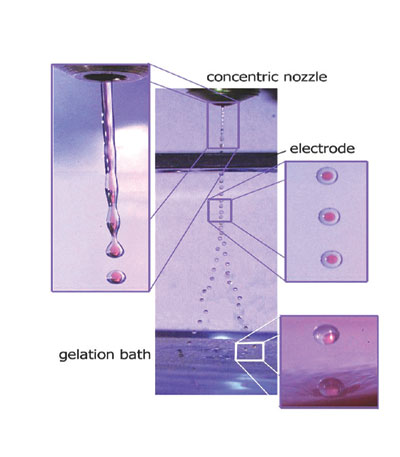A new group under the direction of Ian Marison has transferred during the autumn of 2005 from the Swiss Federal Institute of Technology in Lausanne (EPFL) to DCU. The main research interests of this group are involved at the interfaces of a range of disciplines from high density animal cell culture, process monitoring/ control and in-situ product recovery through to new product discovery. A major area of research involves the production and characterisation of microcapsules for applications in bioartificial organs (islets, hepatocytes), high cell density culture (CHO, HEK, hybridomas, yeasts, bacteria), immobilized enzymes, drug delivery, bioremediation, cosmetics, taste-masking and many more.
 Repeated fed- batch culture of CHO cells encapsulated in cross-linked alginate, PGA, BSA and PEG. Initial cell density 106 cells/ml; final cell density 5x107 cells/ml; external diameter microcapsules 600�m.
High cell density cultures are achieved by creating microcapsules of a defined size, with narrow size distribution, and properties which allow cells to grow protected from their environment, particularly the harsh environment (shear stresses) within bioreactors. Careful choice of parameters enables extension of cell life and perfusion at very high rates to yield high productivities of the desired recombinant protein at a much smaller scale.
Repeated fed- batch culture of CHO cells encapsulated in cross-linked alginate, PGA, BSA and PEG. Initial cell density 106 cells/ml; final cell density 5x107 cells/ml; external diameter microcapsules 600�m.
High cell density cultures are achieved by creating microcapsules of a defined size, with narrow size distribution, and properties which allow cells to grow protected from their environment, particularly the harsh environment (shear stresses) within bioreactors. Careful choice of parameters enables extension of cell life and perfusion at very high rates to yield high productivities of the desired recombinant protein at a much smaller scale.
 Production of liquid-core microcapsules using the jet-break-up technique
Liquid-core microcapsules, in which an organic solvent is surrounded by a hydrogel membrane, can be thermally sterilised and added to bioreactors to recover fermentation products which would otherwise inhibit cell growth and product formation in a process called capsular perstraction. Enzymes may be bound to the surface of these capsules to further allow the conversion of one compound into another, such as in the production of semi-synthetic penicillins and cephalosporins. Similar capsules have been successfully tested for the recovery of organic pollutants such as the pesticides/herbicides atrazine and 2,4-D from drinking water supplies. Nanocapsule versions of these structures have also been used as alternatives to aluminium sulphate and acrylamide derivatives as coagulants/flocculants in drinking water production.
Production of liquid-core microcapsules using the jet-break-up technique
Liquid-core microcapsules, in which an organic solvent is surrounded by a hydrogel membrane, can be thermally sterilised and added to bioreactors to recover fermentation products which would otherwise inhibit cell growth and product formation in a process called capsular perstraction. Enzymes may be bound to the surface of these capsules to further allow the conversion of one compound into another, such as in the production of semi-synthetic penicillins and cephalosporins. Similar capsules have been successfully tested for the recovery of organic pollutants such as the pesticides/herbicides atrazine and 2,4-D from drinking water supplies. Nanocapsule versions of these structures have also been used as alternatives to aluminium sulphate and acrylamide derivatives as coagulants/flocculants in drinking water production.
Contact: Prof. Ian Marison,
School of Biotechnology, Dublin City University, Glasnevin, Dublin 9;
E-mail:
[email protected]
|




